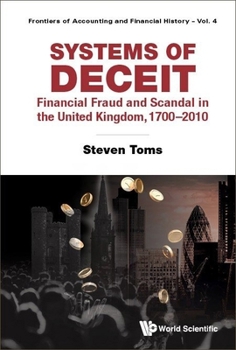Systems of Deceit: Financial Fraud and Scandal in the United Kingdom, 1700-2010
Financial fraud is a serious and seemingly intractable problem. Financial scandals regularly punctuate newspaper headlines and regulators and auditors appear bereft of effective responses. But has this always been the case?This book quantifies financial crime in the UK using three centuries of data. It demonstrates how financial fraud and scandal vary according to systematic economic and institutional arrangements. In doing so, it retells the history of British capitalism, from the mercantilism of the eighteenth century to the financial capitalism of the twenty-first century, illustrating the often negative consequences of economic ideology, policy and structure. It identifies periods when fraud has been less problematic and contrasts these with times when it has surged. The variation of outcomes reflects the balance of power between the state, industrial and financial sectors, the provision of credit through risky lending, and the effectiveness of audits. 'Rogue traders' and other flawed individuals are frequently the focus of blame narratives constructed with the intention of deflecting comprehensive systematic reforms.
Format:Hardcover
Language:English
ISBN:9811281009
ISBN13:9789811281006
Release Date:February 2024
Publisher:World Scientific Publishing Company
Length:320 Pages
Weight:1.31 lbs.
Dimensions:0.8" x 6.0" x 9.0"
Customer Reviews
0 rating





